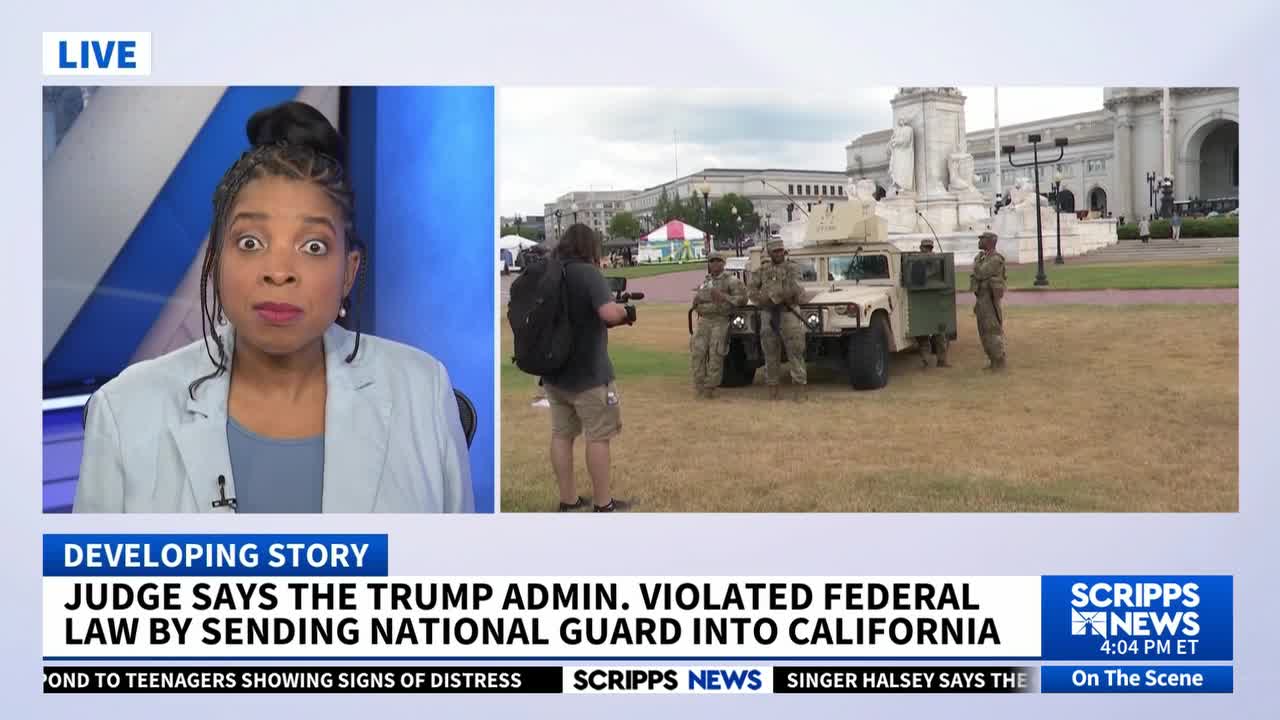President Donald Trump's administration violated federal law in the use of National Guard troops during Southern California immigration enforcement operations and accompanying protests, a federal judge ruled on Tuesday.
U.S. District Judge Charles Breyer in San Francisco did not require the remaining troops to be withdrawn, however. He set his order to go into effect on Friday.
The order comes after California sued, saying the troops sent to Los Angeles over the summer were violating a law that prohibits military enforcement of domestic laws.
Lawyers for Trump's Republican administration have argued the Posse Comitatus Act doesn't apply because the troops were protecting federal officers, not enforcing laws. They say the troops were mobilized under an authority that allows the president to deploy them.
RELATED STORY | Marines, National Guard deployment to LA will cost $134 million, official says
The judge's decision comes as Trump has discussed National Guard deployments in Democratic-led cities like Chicago, Baltimore and New York. He has already deployed the guard as part of his unprecedented law enforcement takeover in Washington, where he has direct legal control.
Trump federalized members of the California National Guard and sent them to the second-largest U.S. city over the objections of Democratic Gov. Gavin Newsom and city leaders. Trump did so under a law that allows the president to call the guard into federal service when the country "is invaded," when "there is a rebellion or danger of a rebellion against the authority of the Government," or when the president is otherwise unable "to execute the laws of the United States."
Roughly 4,000 National Guard soldiers and 700 Marines were deployed to Los Angeles in early June to deal with protests, over the objections of state and local officials. All were pulled back by the end of July, except about 250 National Guard troops.
Trump has pushed the bounds of typical military activity on domestic soil, including through the creation of militarized zones along the U.S.-Mexico border.
Newsom posted on X, in an all-caps reflection of the president's own social media style, "DONALD TRUMP LOSES AGAIN. The courts agree -- his militarization of our streets and use of the military against US citizens is ILLEGAL."
The White House did not immediately respond to a message seeking comment.
Breyer's scathing ruling accused the Trump administration of "willfully" violating the law, saying it used troops for functions that were barred by their own training materials, refused to "meaningfully coordinate with state and local officials," and "coached" federal law enforcement agencies on the language to use when requesting assistance.
"These actions demonstrate that Defendants knew that they were ordering troops to execute domestic law beyond their usual authority," he wrote. "The evidence at trial established that Defendants systematically used armed soldiers (whose identity was often obscured by protective armor) and military vehicles to set up protective perimeters and traffic blockades, engage in crowd control, and otherwise demonstrate a military presence in and around Los Angeles.
Breyer also noted the Trump administration's possible plans to call National Guard troops into other U.S. cities.
RELATED STORY | Pentagon ends deployment of 2,000 National Guard troops in Los Angeles
In Los Angeles, National Guard members joined an operation at MacArthur Park in downtown Los Angeles intended as a show of force against people in the U.S. illegally and those protesting the Trump administration's immigration crackdown. They also accompanied federal immigration officers on raids at two state-licensed marijuana nurseries in Ventura County, Army Maj. Gen. Scott Sherman testified.
Sherman, who initially commanded the troops deployed to Los Angeles, testified during the second day of the trial that he raised concerns that the deployment could violate the Posse Comitatus Act.
He said soldiers were trained on the law and given materials that included a list of activities prohibited by the act, including doing security patrols and conducting traffic control, crowd control and riot control.
Sherman said that while the Posse Comitatus Act prohibits troops from carrying out those actions, he was told by his superiors that there was a "constitutional exception" that permitted such activities when the troops are protecting federal property or personnel.












